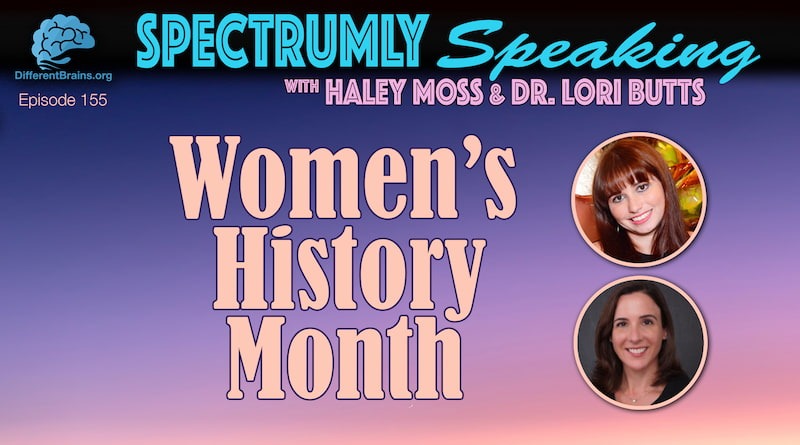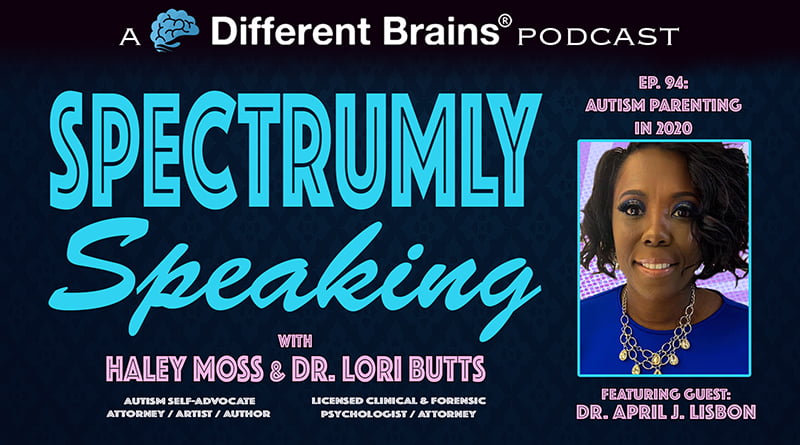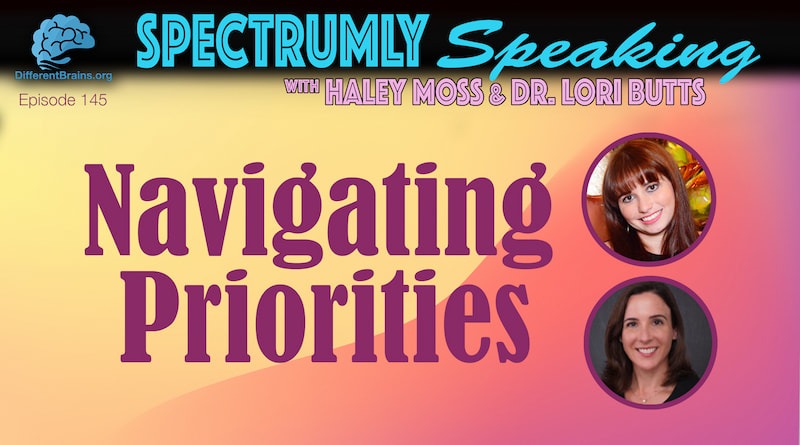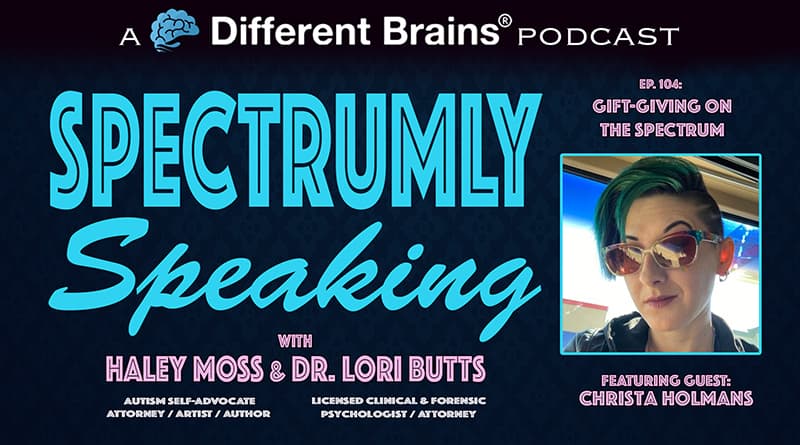
Women’s History Month | Spectrumly Speaking ep. 155
Spectrumly Speaking is also available on: Apple Podcasts | Stitcher | SoundCloud
IN THIS EPISODE:
In this episode, hosts Haley Moss and Dr. Lori Butts, inspired by Women’s History Month, share a few women that have made a big impact on the autism community.
Spectrumly Speaking is the podcast dedicated to women on the autism spectrum, produced by Different Brains®. Every other week, join our hosts Haley Moss (an autism self-advocate, attorney, artist, and author) and Dr. Lori Butts (a licensed clinical and forensic psychologist, and licensed attorney) as they discuss topics and news stories, share personal stories, and interview some of the most fascinating voices from the autism community.
For more about Haley, check out her website: haleymoss.net And look for her on Twitter: twitter.com/haleymossart For more about Dr. Butts, check out her website: cfiexperts.com
Have a question or story for us? E-mail us at SpectrumlySpeaking@gmail.com
CLICK HERE FOR PREVIOUS EPISODES
EPISODE TRANSCRIPTION:
Note: the following transcription was automatically generated. Some imperfections may exist.
HALEY MOSS (HM):
Hello, and welcome to Spectrumly Speaking. I’m Haley Moss, and author, artist, attorney. And I’m proudly autistic. As usual, the Spectrumly stage is not a show of one, but a show of two hosts, me, and the one and only…
DR LORI BUTTS (LB):
Hi, I’m Dr. Lori Butts. I’m a psychologist and an attorney. And I love my introductions by Haley Moss.
HM:
Thank you so much. Have fun with it. Because I’m so used to just doing the intro and putting on that kind of radio voice.
LB:
Yeah, I like it. It’s really good.
HM:
It’s something that keeps me engaged and excited. And I feel like our listeners are probably used to it because if you read the first bit of the intro, I’d be like, Wait, what just happened here? was like my routine would be ruined. Why we should do it, we should ruin my routine and have a live reaction to see I really do autistics handle routine breaks.
LB:
So yeah, there you go.
HM:
There you go. Just as a fun little experiment, except now I’m going to be on the lookout for it. So if that’s in our show notes, before we get started, I’m going to be like You sly foxes. Again, we’re supposed to have fun, right? And I think fun is something we do really well around here. Or at least I hope we do.
LB:
I hope so too. I always have fun. And we’re always
HM:
celebrating something it feels like. And today is no exception. If you didn’t already know. And perhaps our listeners don’t know this, but this is our last episode for the month of March. Which I know the first thing you’re gonna think is Oh, no, you’re gonna Springboard straight into April autism acceptance month content. If that is what you were thinking you are desperately wrong. I said it was March. And for good reason. March marks Women’s History Month. So we are celebrating Women’s History Month, as many of you know that seems to be like every month here at Spectrumly. Given the fact that we’re a podcast that was originally by and for autistic women, and most of our guests are women, non binary, or essentially not cisgender men. So, you know, celebrating Women’s History is pretty awesome. And something that feels very aligned with what we do here. So we thought we would have a discussion about autistic women, some women we found inspirational, all sorts of cool stuff in this line to keep our celebrations going before we hit, you know, everybody’s favorite time of year.
LB:
That sounds great.
HM:
I do not wish to put you on the spot right away. I know that always freaks you out. So I feel like it would be very corny to say that our guests inspire us, but they genuinely do because they do think about something new. Or we just learn or we get to just geek out with somebody having an info dump. Right? It’s really cool stuff. But I want to take a moment to recognize where we’ve come from since it is Women’s History Month. I want to pay homage actually, since this month marks a year since we’ve lost a pioneer in the disability rights movement, Judy Heumann. And I don’t know how familiar you or all of our listeners are with Judy Heumann. But Judy, Judy passed actually last March March 4 2023. And Judy was is known as the mother of the disability rights movement. She was integral in the 504 citizens during the 70s was involved with the Americans with Disabilities Act, all sorts of great stuff and working on stuff for essentially a lifetime. And she worked with the State Department like Judy human was truly an incredible force of nature. And I often say this, that as a younger generation who grew up after the passage of the Americans with Disabilities Act, we stand on the shoulders of giants and pioneers and Judy is no exception to that. So I wanted to kind of pay homage there to start as someone who has inspired me, even though I admittedly did not know a lot of disability history until a lot later than I admittedly should have, you know, because disability history is not something that gets taught in school, right? Well, the studies minor and didn’t even get half the stuff that I wish that I had known. I knew a little bit about disability culture. There are pieces that I had read, that were of course by really incredible disabled activists. But it wasn’t until the Netflix documentary Crip Camp, which of course, features God pretty prominently, that I kind of got the vibe of there’s so much culture, there’s so much intersectionality there’s so many women and people of color and so many amazing allies and disabled people who really paved the way so that my generation grew up with the rights that they didn’t so I wanted to kind of start there, because that’s the first place that my brain went when we’re having this Oh, who’s someone who inspired you? Or someone who might have made a difference? And I, I feel kind of guilty. I want to preface this as well. I feel guilty because I really don’t like throwing around the inspiration word too much when it comes to other people with disabilities. If you haven’t seen it before, there’s a really fantastic TED Talk by the late Stella Young, who was also somebody who is incredible. And Stella is the one who is really credited with the whole, I’m not your inspiration. Thank you very much. That’s the name of her TED talk about how we objectify people with disabilities for doing mundane things. We think they’re an inspiration. They’re amazing. Basically, you got out of bed in the morning, therefore, you deserve an award. And she calls this concept inspiration porn, sort of how we objectify one group of people for the benefit of another. And I feel bad when I say someone like Judy is an inspiration, even though I don’t think it’s because Judy was disabled, but because she’s actually just a badass human being. So if I say you are a person with a disability, and I say you’re an inspiration, I’m not saying it with an objectification. I’m saying it because you were pretty, pretty awesome. Right?
LB:
Yeah. And I mean, I think everybody that we talked to, that we’ve spoken to has been inspirational to me in a way, but I hope it doesn’t ever come across because it’s disability porn, just because we just talked to really incredible women doing really incredible things. And so I’m super inspired by by everyone, not because they’re disabled and doing wonderful things. It’s just because they’re doing wonderful things. So I get what you’re saying. And I also wanted to say, did it? Did it take you into law school to learn about Judy human was that were you? Or was it before them?
HM:
I’m not really sure when it was that Judy’s work really kind of came on my radar. I was familiar with something about the 504 sit-ins. I don’t remember when that clicked. But crip camp, which came out a couple of years ago, I think that was 2020 really put her in the spotlight and I got to watch her speak at a couple of events. And one of my friends introduced us and we got this week, I got to talk to her for a little bit, which was extremely cool. And she also was a podcaster. There’s all sorts of cool stuff. And if you don’t know a lot about the 504 sit-ins probably one of my favorite things that came about right after right before that, a couple years when I was in law school maybe was there was a really fantastic episode of Drunk History from Comedy Central, that talked about the survival force. She was played by Ali Stroker, who was the first wheelchair user to win I believe it was a Tony. So it was a very cool episode. If you’re into that stuff, and you want to get history with a side of humor, go watch some drunk history for me. I know doesn’t sound like the thing that we would normally endorse here because you’re on the PGA Show. But dude, watch rock history for five or four, it’s probably better as a quick 810 minute clip for you to learn rather than go sit through a documentary of sitting through a documentary is not your style. Right. And I think there’s something extremely cool about, you know, the all the tie ins and getting to learn things in an accessible and entertaining way. Right?
LB:
Absolutely.
HM:
So I think that might have been exactly what brought it on my radar was honestly, I wouldn’t be surprised if it was drunk history. Wow. Not because I don’t remember what I 100% learned as a major, except there was one article or essay I remember really reading and undergrad called unspeakable conversations. And it was written by I wish I remember the name of her I’m gonna I’m gonna look up who wrote it as we talk, just so I know. It Harriet McBride Johnson and she had a disability, I believe, as well. She was, I believe, also a lawyer. And it was about having these conversations about the right to live and having this life as a person with a disability with this kind of ethicist guy who thought that, you know, these people are better off not being alive type thing. And then she essentially, quote unquote, debated and had this very awkward corresponding friendship with the guy. It was probably one of those essays from that from college that has stuck with me for many, many years. Oh, wow. And there’s a lot of things in disability history that I know we don’t usually get to talk about here. But I find interesting and then I think that a lot of the things that have impacted me or that have stuck with me happen to have been written by or worked on by women. So go figure. Yep. And I know before we got started, we were talking about Temple Grandin. Right?
LB:
Yeah, I was reading a New York Times article Call this weekend about how do I explain it in short version. So JFK The airport has this place that I didn’t know know existed for animals and animals that have to like come through that come through, like internationally or, you know, they have all these animals on the grounds of JFK, they have like a, I don’t even know how many acres facility that they have. And it was helped, she helped design it. And so so these animals that come in and have to, like they have 60 dogs that just came in from Israel. They had these like ponies that came in from Iceland, and they’ve got it, they have this whole facility to manage and to deal with, like, state holdover animals that are passing through. And anytime they can have all different kinds of animals. And so I saw that she helped design this facility, and they showed pictures of this facility. It just sounded so fascinating and amazing. And I mean, obviously, we know her work and be interviewed her. I know, I know, but I wish I could ask her about that. I had no idea when we interviewed her about this, this JFK facility.
HM:
I didn’t know what the either until you just taught me about it. My biggest takeaway from our interview is I remember sitting there trying not to sound like a total geek and a fan girl and then remember, she gave me driving advice.
LB:
She did!
HM:
About practicing in an open field. And you and I definitely were thinking, Oh, what about the Everglades? Right. Like we couldn’t say anything.
LB:
I was thinking more like a mall that’s like been closed up a mall parking lot.
HM:
That’s actually how I learned to drive was in a corporate parking lot. So that was where I learned to drive. But I didn’t work but and I apparently the parking lesson never quite stuck. Like I was obviously absent that day.
LB:
That’s really funny.
HM:
I must have been absent that day from driving school because I’ve been absent from it the rest of my life. I tried to laugh about my predicament. It makes life a little bit better. .
LB:
Yeah. Well, that’s that’s how we all get through the days.
HM:
I think part of the disability experience is learning to laugh and make fun of certain things. Yeah. Otherwise, you’re just gonna be depressed.
LB:
Right. I mean, I think that’s part of the women experience is experience to being a woman and seeing kinds of things that just, we go through that are very different. We all just have to laugh.
HM:
Oh, absolutely. And I think something else worth highlighting, while we talk about women’s history is a little bit of the history of autistic women. Since if you know a little bit about autism history, I know wow, I sound like such a geek tonight. But or today for that matter. But like women have always sort of been excluded for a very long time. If you go back even through the research that started before during World War 2 and stuff like that, and even up to early 2000s, that it was believed that autism mostly just affected boys and men, there was the extreme male brain theory, all this other stuff. And as you know, and as is seems to be a running theme, both here on Spectrum and in the wild, a lot of the women that we meet don’t get diagnosed until much later in life. They’re not usually given the privilege of a childhood diagnosis for so many different reasons. So I think part of that history of this community is really highlighting those inequities and realizing just how much work and effort and things behind the scenes that don’t get the praise, that don’t get the same spotlight, perhaps that autistic women have to survive and thrive and, you know, just endure. Trying to be mindful of experiences that are not mine.
LB:
Right. Right. And again, you know, I mean, it’s just, you know, just have to kiss, keep carrying on with as much of a positive attitude as, as you can just keep continuing to educate and communicate. And that’s why things like Women’s History Month in our podcast are so important to me, is just to help continue to promote equities and in diversity.
HM:
Absolutely. That we can’t we’re doing the best that we can. We’re nothing less. That’s something that I’m very proud of. And I hope that we keep celebrating instead of just looking at where we’ve come from, but I hope we continue to write a good story of history or herstory, as I’ve heard it referred to as.
LB:
Right.
HM:
I want us to do better, and I hope that our podcast plays a small role in that.
LB:
I hope so too. I mean, it certainly does for me personally. So yeah,
HM:
Redlands uplift voices who don’t often get the stage.
LB:
Yes, yes.
HM:
We say we always forget to do that. But I really try to make sure that we reiterate it around here. Because if, for some reason we are not doing great at it, I hope somebody writes it and keeps us accountable.
LB:
Absolutely.
HM:
So keep us posted. I mean, we want to celebrate and uplift and also be a source of empowerment and joy. And not all doom and gloom around here. Already scary enough on the outside, we might as well have a nice little safe space to listen along to you. Right.
LB:
Exactly.
HM:
So stay awesome, everybody stay empowered. And we know that April is sometimes a very mixed motions type of month depending on how you view autism acceptance month. So we will be back in April with more exciting content and more interesting things for you. But for now, we are celebrating the end of March Spring has sprung Women’s History Month is coming to a close and we are reflecting and having a great time. I think that is a great place for us to end our discussion. Be sure to check out differentbrains.org And don’t forget to check out their Twitter or X and Instagram at @DiffBrains and you can also look for them on Facebook. If you are looking for me yours truly, you can say hello at Haleymoss.com or you can say hello to me on Facebook, X — I remember this time TikTok, instagram or whatever makes you happy. Let’s chat.
LB:
I can be found at CFIexperts.com Please be sure to subscribe and rate us on Apple podcasts or your podcast app of choice and don’t hesitate to send questions to Spectrumlyspeaking@gmail.com. Let’s keep the conversation going.

Spectrumly Speaking is the podcast dedicated to women on the autism spectrum, produced by Different Brains®. Every other week, join our hosts Haley Moss (an autism self-advocate, attorney, artist, and author) and Dr. Lori Butts (a licensed clinical and forensic psychologist, and licensed attorney) as they discuss topics and news stories, share personal stories, and interview some of the most fascinating voices from the autism community.




